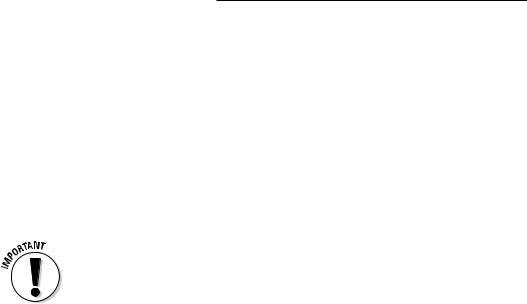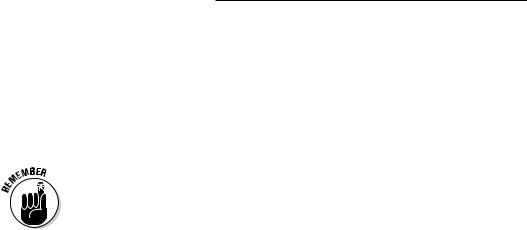
- •About the Author
- •Dedication
- •Author’s Acknowledgments
- •Contents at a Glance
- •Table of Contents
- •Introduction
- •About This Book
- •Conventions Used in This Book
- •How This Book Is Organized
- •Icons Used In This Book
- •Where To Go From Here
- •Understanding Sociology
- •Seeing the World as a Sociologist
- •Social Organization
- •Sociology and Your Life
- •Sociology for Dummies, for Dummies
- •Figuring Out What Sociology Is
- •Discovering Where Sociology Is “Done”
- •So . . . Who Cares about History?
- •The Development of “Sociology”
- •Sociology’s Power Trio
- •Sociology in the 20th Century
- •Sociology Today
- •The Steps of Sociological Research
- •Choosing a Method
- •Analyzing Analytical Tools
- •Preparing For Potential Pitfalls
- •Studying Culture: Makin’ It and Takin’ It
- •Paddling the “Mainstream”
- •Rational — and Irrational — Choices
- •Symbolic Interactionism: Life is a Stage
- •The Strength of Weak Ties
- •Insights from Network Analysis
- •Excavating the Social Strata
- •The Many Means of Inequality
- •Race and Ethnicity
- •Sex and Gender
- •Understanding Religion in History
- •Religion in Theory . . . and in Practice
- •Faith and Freedom in the World Today
- •Criminals in Society
- •The Social Construction of Crime
- •Becoming Deviant
- •Fighting Crime
- •The Corporate Conundrum: Making a Profit Isn’t as Easy — or as Simple — as it Sounds
- •Weber’s Big Idea About Organizations
- •Rational Systems: Bureaucracy at its Purest
- •Natural Systems: We’re Only Human
- •Social Movements: Working for Change
- •Sociology in the City
- •Changing Neighborhoods
- •Life in the City: Perils and Promise
- •The Social Construction of Age
- •Running the Course of Life
- •Taking Care: Health Care and Society
- •Families Past and Present
- •Why Societies Change
- •What Comes Next?
- •Sociology in the Future
- •Randall Collins: Sociological Insight
- •Elijah Anderson: Streetwise
- •Arlie Hochschild: The Second Shift
- •Think Critically About Claims That “Research Proves” One Thing or Another
- •Be Smart About Relationship-Building
- •Learn How to Mobilize a Social Movement
- •Run Your Company Effectively
- •With Hard Work and Determination, Anyone Can Get What They Deserve
- •Our Actions Reflect Our Values
- •We’re Being Brainwashed by the Media
- •Understanding Society is Just a Matter of “Common Sense”
- •Race Doesn’t Matter Any More
- •In Time, Immigrant Families Will Assimilate and Adopt a New Culture
- •Bureaucracy is Dehumanizing
- •People Who Make Bad Choices Are Just Getting the Wrong Messages
- •Index

296 Part V: Sociology and Your Life
Why Societies Change
As in most other aspects of sociology, debate over social change often returns to the ideas of Marx, Durkheim, and Weber — not just because they’re Marx, Durkheim, and Weber, but because together they laid out three views of social change that represent three convincing but distinctly different arguments for why and how societies evolve. Understanding their views on social change is a good starting point for understanding how sociologists today think about the subject.
See Chapter 3 for more on Marx, Durkheim and Weber, the “big three” sociologists.
Marx: If it’s not one revolution, it’s another
In all things, Karl Marx emphasized the importance of the material world and the distribution of resources. Marx thought that societies changed as different social groups fought over things like food, land, and power.
Marx was what’s known as a “stage theorist”: He thought that social change happened not gradually, but relatively suddenly. A society might be in one stage for centuries, then over the course of just a short period it might totally reorganize itself and move to the next stage. Further, he believed that the basic progression of stages was essentially universal and inevitable — just as all human beings go from being infants to toddlers to young children to adolescents to adults, Marx believed that all societies have to work through certain conflicts on their way to a final utopian stage — which, he believed, all societies would eventually achieve.
In Marx’s ideal society, everyone would have access to their share (or, if they had special needs, more than their share) of social resources, and everyone would contribute their share (or, if they had special abilities, more than their share) of resources to the common good.
Similar to Durkheim and Weber, Marx did a tremendous amount of historical research. When he looked at human history, Marx saw a series of historical stages, in each of which there were divisions among social classes. The nature of those classes changed, thought Marx, from time to time — slaves
and slave owners, feudal lords and serfs, merchants and farmers. Each period of time, thought Marx, had its own “mode of production” in which the various classes were organized in a particular way to do the work required to provide for everyone’s needs.

Chapter 16: Future Passed: Understanding Social Change 297
None of the modes of production, though, have been perfect. In a perfect society, everyone would work together happily and harmoniously to grow food, build houses, and do everything else that needs to get done. That would only happen, though, said Marx, if the division of the fruits of the labor were equal — if everyone got a fair share of the goods created by the classes’ collective labor. That’s never happened.
To understand Marx’s theory of historical change, think about trying to get somewhere on a bike when your friends keep jumping on. One of your friends might hop on the pegs on the rear wheel, another might jump on the handlebars, and maybe someone even tries to sit on the bike’s crossbar. You can keep going for a little while — and, for your friends, that’s nice while it lasts — but before too long you’ll get tired and have to stop, or maybe even wipe out, in which case everyone is likely to get hurt.
For Marx, every mode of production has in one way or another been like that. Society can exist for a while with one class doing more than its share of the work and reaping less than its share of the rewards, but over time, that class builds resentments and anger — even as it becomes more and more crucial to everyone else’s well-being. Eventually, the exploited people can’t take it any more and rise up in opposition or otherwise sabotage the system. At that point, the system is essentially broken and needs to be rebuilt. The rebuilt system — the next mode of production — will be superior to the previous mode of production in some ways, but it will have its own problems that will eventually lead to its downfall.
Most attention (in this book and elsewhere) has been given to Marx’s theory about what’s specifically going to happen next: that the current mode of production — capitalism — will give way to communism. Marx believed that the proletariat, who are being exploited by the bourgeois, would one day revolt and overthrow the inequitable system to replace it with a perfectly fair communist system, in which each person contributes what they can and takes what they need.
So why hasn’t this happened? That’s not an easy question for Marxists to answer. For all its imperfections and injustices, capitalism has actually been spreading around the world since Marx’s time. Some societies that have experimented with communism (notably the defunct U.S.S.R.) have relapsed to capitalism, and the world’s biggest nominally communist society — China — is becoming de facto more capitalist every day. Where’s the revolution?
There are at least a couple of different answers. Some Marxists believe the revolution is still coming: that inequality is continuing to grow, and that revolution has only been thwarted by cunning maneuvers on the part of the bourgeois. (For example, exporting inequality — see Chapter 8.) Thinkers like

298 Part V: Sociology and Your Life
Noam Chomsky and Ralph Nader believe that people in power are oppressing the disadvantaged just as much as they ever were, that the system is just as corrupt as it ever was, and that revolution is necessary, perhaps inevitable.
Other Marxists observe that significant changes in technology and economic organization have made the division between the haves and have-nots less stark than it was in Marx’s time. Technological progress has lifted the standard of living around the world, so everyone is objectively living better than they were in the 19th century. Both technological and social changes have created a large middle class that didn’t exist in Marx’s time (see section “The growth of the middle class,” later in this chapter). If this situation persists, the revolution Marx anticipated may not come about because the circumstances Marx saw have changed dramatically.
The bottom line is that for Marx, social change is about conflict: about groups fighting for resources and power. Marx believed that when a communist utopia is finally achieved, social history will essentially come to an end because there will be no more conflict to drive social change. We’ll see!
Durkheim: Increasing diversity
Emile Durkheim agreed with Marx that social change followed a certain predictable progression, but he strongly disagreed with Marx about the nature of that change and the reasons for it. (See Chapter 3 for more on Durkheim’s life and work.)
The fundamental point to understand about historical change, said Durkheim, is that society is getting bigger and more complex. That’s happening for a number of interrelated reasons. As technology develops, societies are able to sustain greater and greater populations of people who travel and communicate in wider and wider circles.
For tens of thousands of years of human history, people had to work very hard all the time at procuring the basic necessities such as food (first by hunting and gathering, later by farming) and shelter (from the elements and from each other). Everyone had to help with these basic tasks, leaving little room for real diversity. In a hunting-and-gathering band, it isn’t really constructive to have a wide-ranging and vigorous debate about where the band will roam next — much less about what language should be spoken or about the meaning of life. Everyone had to pitch in with the basic tasks, and that was that. If you didn’t like it, you could leave and try to go join another band where you’d inevitably be doing just about exactly the same thing.
As technology developed, there was more need for a division of labor. A small farming community might have specialists in raising crops, specialists in raising animals, and specialists in facilitating trade. There became the need for specially trained blacksmiths, builders, and shopkeepers. Eventually,

Chapter 16: Future Passed: Understanding Social Change 299
societies supported standing armies of professional soldiers whose job was to keep the wolves (actual and figurative) at bay. There started to be genuine diversity: The life of a farmhand was wildly different from the life of a shopkeeper or a knight-errant.
Today, people work at an astounding variety of extremely specialized occupations. My cousin’s husband works at an auto plant, where some days he does nothing but screw dome lights into trucks’ ceilings. My sister works at a firm where she sells software services that facilitate communication between retailers and suppliers. I’m writing a book that might be of interest to some people studying a particular academic discipline, very few of whom will take their studies in that discipline far enough to earn a living from it. Globalization has connected people around the world, but that means the people connected include a rickshaw driver in Vietnam, a stockbroker in Manhattan, and an artist in Uganda. All three of those people exist in the
same global society, but they couldn’t even speak with one another if you put them in the same room together.
Durkheim believed that all aspects of social change are tied to this sweeping historical change. This diversity makes society stronger — not just in the sense that you get to meet interesting new people, but in the sense that when people organize themselves into a division of labor, they’re able to accomplish more. If each of the workers at an auto plant were given responsibility for building a car from start to finish, their jobs might be more interesting, but they’d get far fewer cars built. If everyone in society did the same job, that job would be farming or hunting, and everyone would be right back
to the prehistoric days — complete with comfy rock floors to sleep on and handy flint knives to prepare food with. Only because of the division of labor can we have waterbeds and Ginsu knives.
As the division of labor increases, profound social change comes with it. People need to accept — in fact, embrace — diversity because their livelihoods depend on it. All aspects of society change to accommodate the increasing division of labor.
Laws become less about forcing citizens to do certain things and more about keeping them from infringing on other people’s prerogative to do different things.
Governments — and all other social organizations — become more open and democratic rather than closed and hierarchical.
Formal education increases across society, to prepare citizens to enter an increasingly specialized workforce.
Religions become more tolerant, more ecumenical, and less dogmatic. (The relatively few exceptions are especially visible, but the fact that they stand out proves the overall rule.)
Social statues and roles become much more flexible.

300 Part V: Sociology and Your Life
Durkheim identified this change as the transition from “mechanical solidarity” to “organic solidarity.” More on this transition — specifically as it applies to religion — is in Chapter 10, but in terms of social change, the important point to understand is that Durkheim believed that social change is driven by increasing diversity and functional differentiation. Unlike Marx, Durkheim believed that what fundamentally drives social change is people cooperating to bring about a better world rather than groups competing for a share of the world that exists.
Sound a little pie-in-the-sky? Maybe . . . Marx would certainly say so! Still, consider the fact that an international group of researchers recently showed that global conflicts have been declining over the past half-century, both in overall number and in the number of fatalities. Does this mean that there’s another great conflict simmering and waiting to erupt (as Marx would say), or does it mean that peace is on the march (as Durkheim would say)? Only time will tell.
Weber: Into the iron cage
Max Weber came after Marx and Durkheim and was familiar with their work. He also conducted a great deal of historical research, and he had his own ideas about what forces bring about social change. (See Chapter 3 for more on Weber, who many sociologists today consider the most insightful sociologist of all time.)
Weber agreed with Marx that history was often marked by conflict, and that the results of conflicts could have profound consequences for the direction society would take thereafter. He agreed with Durkheim, though, that conflict over material things wasn’t the bottom line; that ideas and values could be even more powerful than hunger. When he put those two ideas together, what Weber ended up with was a theory of history that didn’t have the inevitability of Marx’s or Durkheim’s.
For Weber, history was a little bit like a mystery novel that you open on the last page. You know how the story ends, but you don’t know how it got to that point. The butler’s dead, but was he killed by the rich heiress because he knew too much? Or was he killed by the maid after he was unfaithful to her? Or perhaps was he killed accidentally by a person who mistook him for someone else? The ending may not seem to make any sense, but of course if you went back and read the story from the beginning, it would all become clear.
The trick is that when it comes to understanding social change, “the book” is thousands of years long and includes every word ever written. That’s a lot of information to sift through, but somewhere in there is the explanation for why society is the way it is. What this means is that Weber didn’t have a tidy overall theory of history the way that Marx and Durkheim did.
